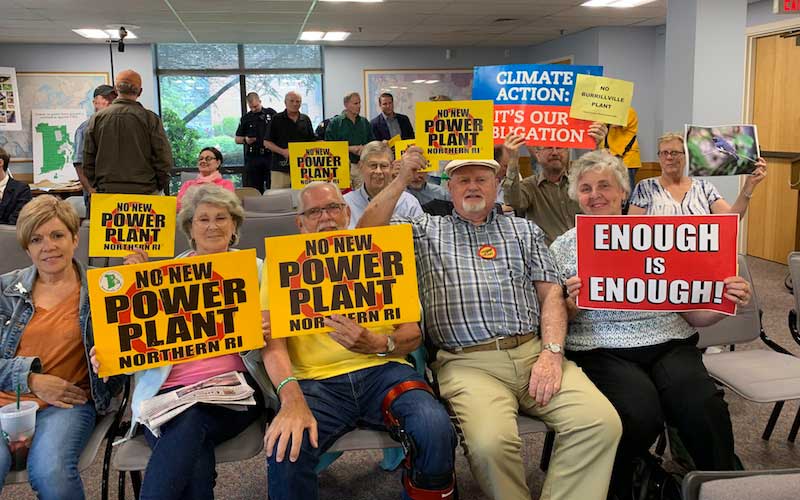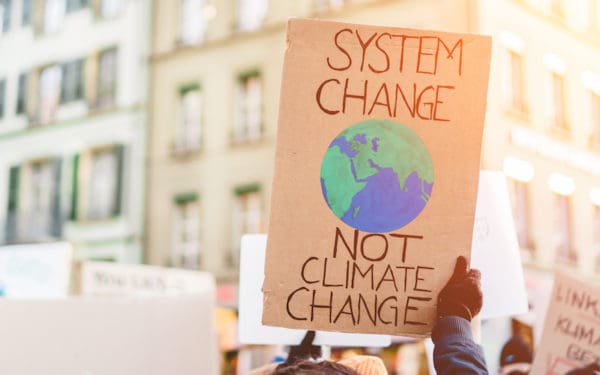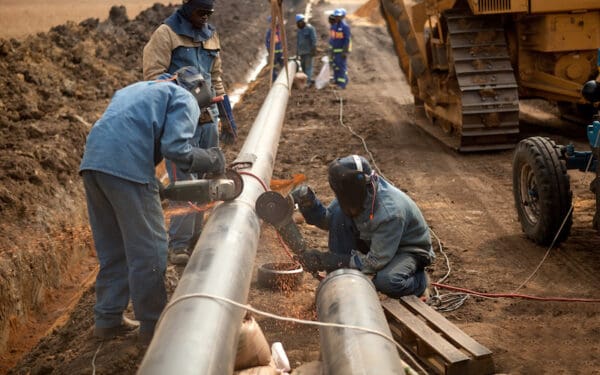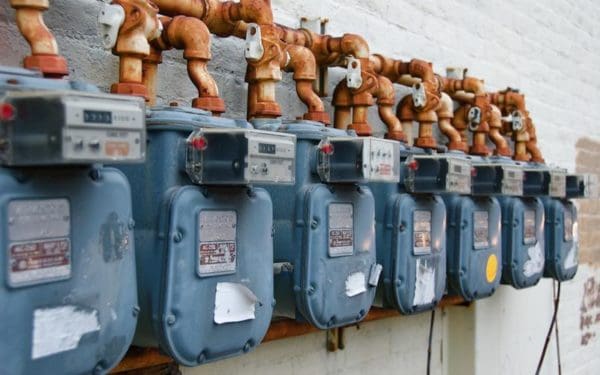
The Final Hearing for Invenergy at the Rhode Island Siting Board has come to a close, with Invenergy denied a permit they need to start construction. Photo Credit: CLF
Today, Invenergy was denied a permit to pave over a pristine forest in Burrillville to build a fracked gas and diesel oil power plant that would emit carbon pollution for decades. This is a victory for CLF, for the people of Burrillville, and for a world facing a climate emergency.
CLF, the town of Burrillville, and many others have been fighting this plant for years. We’ve worked to show how the plant isn’t needed in New England and would cause unacceptable environmental harm to Rhode Island and prevent us from reaching our climate goals. Today, the Rhode Island Energy Facility Siting Board agreed with us that this plant is unnecessary.
New England Doesn’t Need the Invenergy Plant
By law, the Siting Board cannot grant a building permit for a new power plant unless the plant is needed and building the plant would not cause unacceptable environmental harm.
Thus, CLF’s case emphasized the fact that Invenergy’s fossil fuel power plant just wasn’t needed to keep the lights on. CLF’s expert witness on need was Robert Fagan, who filed no fewer than five volumes of testimony with the Siting Board (see here and here).
In this context, it was deeply gratifying to have the Siting Board vote unanimously that the plant was not needed.
The Plant Would Have Caused Unacceptable Environmental Harm
As CLF has argued for years, building this new fracked gas power plant would cause unacceptable harm to the environment. These harms involved both climate impacts from carbon emissions and non-climate impacts that would result from the destruction of a pristine forest.
CLF’s expert on carbon emissions, Dr. Timmons Roberts, testified that building this power plant would make it impossible for Rhode Island to meet its short-, medium-, or long-term climate goals.
Scott Comings, of The Nature Conservancy, testified for CLF on other environmental impacts, including species habitat, forest connectivity, resilience, and biodiversity. He showed that the forest where Invenergy wanted to build its power plant was uniquely valuable to the animals of New England. Building anything in this area would ruin valuable habitat, disrupt animal’s ability to move through New England, and ultimately damage the entire ecosystem.
The Siting Board agreed that the plant would cause environmental harm, but declined to vote on whether that harm would be unacceptable or not. They didn’t need to vote on this point, as once it was decided the plant was not needed, they could not grant Invenergy a permit.
It Has Been a Long Battle
This has been a really long fight. The case started way back on October 29, 2015, when Invenergy filed its 473-page application to build a fracked gas power plant. CLF intervened in the case the next day.
This has been the largest case in the history of the Siting Board. There were 45 witnesses, 37 of whom filed at least one volume of pre-filed testimony–and some filed as many as five volumes. There were 13 governmental Advisory Opinions and several Supplemental Advisory Opinions. There were hundreds of exhibits totaling tens of thousands of pages. The Final Hearing was conducted on 30 separate dates over the course of a year, producing 30 volumes of stenographic transcript.
It Was Only by Working Together That We Defeated Invenergy
While CLF was the only environmental organization litigating against Invenergy, scores of organizations and thousands of individuals participated in the fight. The Environment Council of Rhode Island, a coalition of every small, medium, and large environmental group in the state, consistently opposed Invenergy.
Perhaps most importantly, the people of Burrillville worked tirelessly to ensure that Invenergy would not be built. For example, local citizens organized successfully to pressure several local water districts to deny water to Invenergy. This was a huge blow to the company and caused serious delays which helped kill the plant. Local activists also persuaded 34 cities and towns to pass resolutions opposing Invenergy. This, too, was huge, because it showed the Siting Board and the public that opposition to Invenergy did not just stem from NIMBYism (the “Not In My Backyard” mentality).
Indeed, one of the important take-home lessons from the long struggle against Invenergy is the success that environmentalists and community members can have when we work together. Opposing Invenergy was truly a group effort of organizations and people – and today we were successful. As I have said before, the opportunity to work collaboratively with environmental colleagues and local residents is one of the things I love most about my job.
This Case Is Proof That Local Activists Can Have a Big Impact
Another lesson we can learn from this victory is not to be daunted by the strength of the opposition. Over the course of this case, Invenergy spent over $45 million on lawyers, engineers, and experts. The Chicago-based company was represented by seven lawyers from three firms in two states, and never had fewer than five lawyers at the Siting Board at one time. To be honest, it was sometimes daunting to go up against such massive firepower. But that is also part of what makes this victory so sweet – the little guys beat the big guys this time.
This is another thing I love about working for CLF – we are willing to take on the big guys. For example, in 2016, CLF brought a federal lawsuit against ExxonMobil for decades of climate deceit. And in 2017, CLF sued Shell Oil right here in Rhode Island for ignoring climate dangers. The reason CLF takes on these big companies – like Invenergy, Exxon, and Shell – is to address the climate emergency and help create a New England where everyone can thrive for generations to come.
The climate crisis is a very, very big problem. But today’s victory shows that we can make progress – even against big, well-funded opponents.
What’s Next?
Invenergy has the right to appeal the permit denial to the Rhode Island Supreme Court and has said that it intends to do so. If Invenergy makes good on that threat, the battle will move to our Supreme Court and CLF will fight Invenergy there.
In that case, we will once again need your help fighting this large, well-funded opponent to safeguard the health, quality of life, and prosperity of our families and neighbors here in New England.




